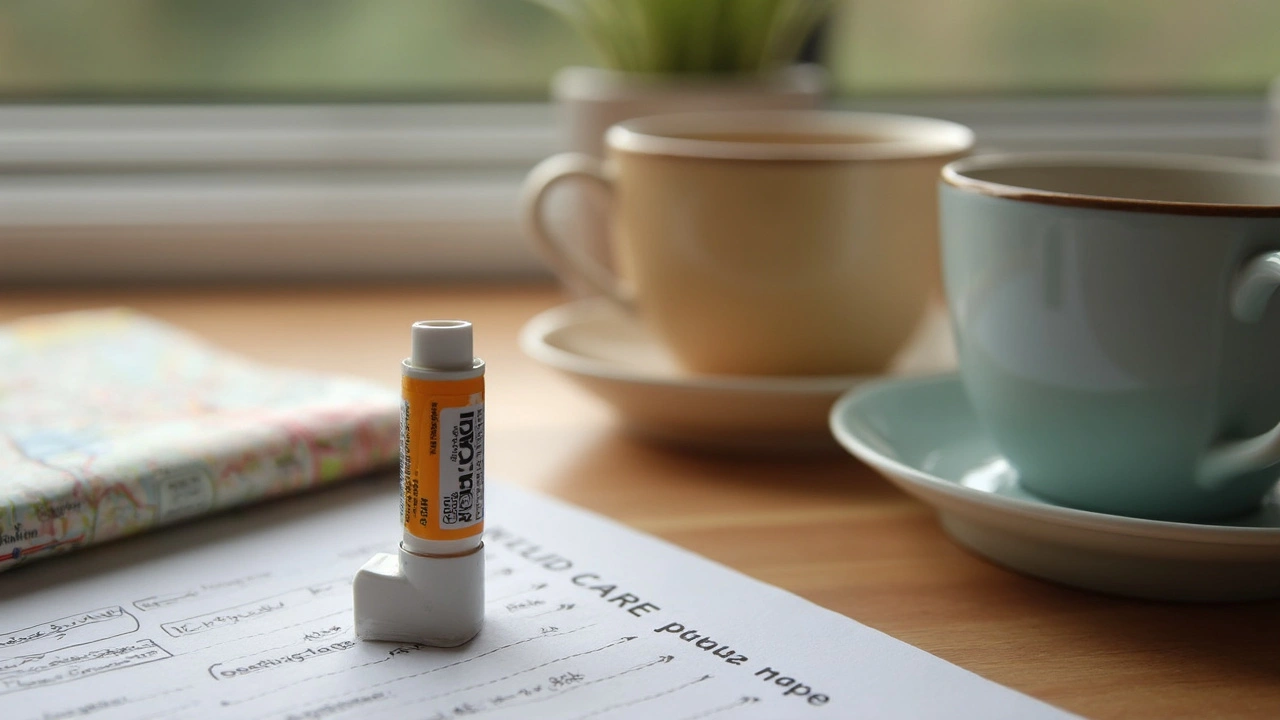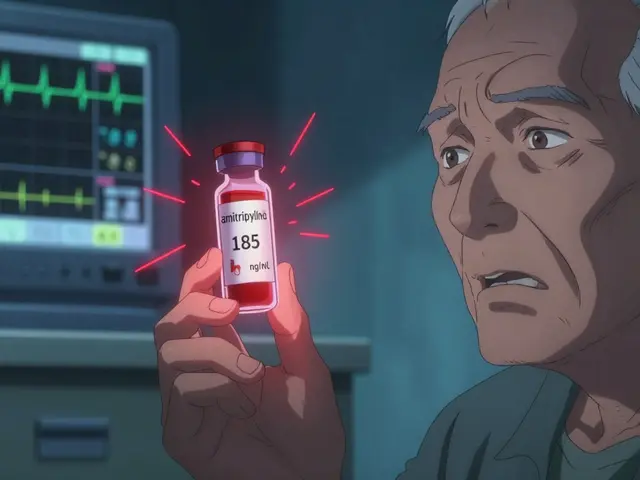Wheezing, tight chest, that familiar panic as you realize there’s just one lonely puff left in your inhaler. It feels like you blinked and your last refill vanished. What now? Skip this refill snafu, and you might be hit with a double whammy: compromised breathing and a heaping dose of anxiety. But you’re not stuck gasping for solutions. Let’s talk about what really works—OTC epinephrine inhalers, pharmacy bridge tactics, and how to keep asthma attacks from bossing you around if you run out unexpectedly.
The Situation: Out of Refills & Out of Breath
You're standing at the medicine cabinet, shaking your inhaler, and there’s absolutely nothing coming out. Maybe you’ve got a few puffs left, but it’s clear—you’re down to the wire. Does this scene ring a bell? Nationwide, more than 25 million Americans live with asthma, and almost 4 million will end up in the ER at least once this year, often because their rescue inhaler ran out or wasn’t available. That’s not just a statistic—it’s real people scrambling to breathe.
Panic sets in when you realize your prescription’s expired or the pharmacy can’t refill it until your doctor gives the green light. It’s after hours, or maybe you’re traveling. Asthma, unfortunately, doesn’t consult your calendar. The need for a albuterol inhaler substitute becomes urgent really fast. And, yep, there are options beyond toughing it out or calling every doctor in your contacts list.
Asthma symptoms can spiral quickly. Mild shortness of breath can turn into wheezing, chest tightness, or a full-blown attack. Every minute counts—that’s why understanding your alternatives before this moment hits is crucial.
If you’ve been prescribed albuterol, you already know how vital it is for quick relief. But other rescue inhalers do exist. If you’re desperate, a few are now easier to get than years past, but not everything on the shelf at your local drugstore is actually a safe substitute. Let’s break down what’s safe, what’s risky, and what to try when you can’t get your hands on your usual inhaler.
OTC Epinephrine Inhalers: What to Know Before You Try
So what about over-the-counter (OTC) epinephrine inhalers? The name that pops up most is Asthmanefrin, and historically, Primatene Mist. Not long ago, these products were almost extinct due to regulatory changes—hence the older generation’s grimace when you mention “OTC inhaler.” In 2012, Primatene Mist was pulled from shelves because of its original propellant, but a reformulated version is back in most U.S. pharmacies.
How do these OTC products compare to your albuterol inhaler? Here’s the real scoop:
- Active ingredient: OTC inhalers like Primatene Mist and Asthmanefrin use epinephrine, which is different from albuterol (a selective beta-2 agonist). Epinephrine hits both the heart and lungs, which can mean more side effects: think racing heart, shakes, anxiety. Albuterol mostly targets the lungs, so it’s usually better tolerated by regular asthma folks.
- Effectiveness: Epinephrine inhalers probably won’t open your airways as well as albuterol, especially for those with moderate or severe asthma. For mild, occasional symptoms though, they may help tide you over.
- Accessibility: You can buy Primatene Mist without a prescription at most big pharmacies. Asthmanefrin is available online or at select stores, but its delivery device is more old-school (nebulizer instead of a metered-dose inhaler).
- Proper use: OTC inhalers are meant as a temporary fix, not a daily habit or a replacement for your prescribed plan. If your symptoms don’t improve, or if you need the inhaler more than once or twice in 24 hours, that’s a red flag—time to call for medical help.
- Not for everyone: People with heart disease, high blood pressure, thyroid problems, or who are pregnant should not use OTC epinephrine inhalers without a doctor’s okay.
Here’s a snapshot comparing albuterol and OTC epinephrine inhalers:
| Feature | Albuterol Inhaler | OTC Epinephrine Inhaler |
|---|---|---|
| Active Ingredient | Albuterol Sulfate | Epinephrine |
| Prescription Needed? | Yes | No |
| Onset of Action | 5-10 min | 1-5 min |
| Duration | 4-6 hours | 1-2 hours |
| Side Effects | Rare (tremor, fast heart rate) | Common (anxiety, shaky, palpitations) |
| Who Can Use? | Most with asthma | Not for those w/ heart problems |
So yeah, OTC epinephrine isn’t a perfect match for albuterol. But if your options are limited, having a Primatene Mist tucked away for emergencies beats nothing at all. Remember though, this isn’t for long-term use—and never rely on these as your everyday asthma solution.

Pharmacy Bridges: Getting a Rescue Inhaler Fast
What can you do if you’re between refills, can’t reach your doctor, or simply can’t wait? Enter the pharmacy bridge—a quiet lifesaver at some major chains. A pharmacy bridge is basically a stopgap measure: the pharmacy gives you a short-term supply of medication (usually just enough for 3-7 days), ensuring you don’t end up in the ER while you wait for a new prescription.
How do you get this “bridge?” Here’s what usually works:
- Pharmacist authority: Some states allow pharmacists to dispense an emergency refill of your rescue inhaler—even if the prescription has expired—if it’s crucial for your health.
- Proof of prior prescription: You’ll need to show your old, empty inhaler or proof you’ve been prescribed this medication before. Pharmacies access your prescription history pretty quickly.
- Bridge supply limits: Don’t expect a full month’s supply. Usually you get just enough to get you safely to your next doctor visit. Think 1 inhaler or even just a few days’ worth (depending on state regulations and insurance allowances).
- Costs: This can cost more out-of-pocket if your prescription is entirely expired, since your insurance may not cover a non-renewed refill. Still, paying cash for a bridge is almost always cheaper than paying for an ER visit triggered by an asthma attack.
Some pharmacy chains even have specific “emergency supply” forms. CVS, Walgreens, and Walmart report that they routinely provide bridge refills for inhalers. The American Pharmacists Association supports these efforts, especially if the patient’s issue could be life-threatening.
Just remember—this is a one-time bandage, not a cure for running low every month. You’ll want to follow up with your doctor, and make sure you’ve got that next refill planned way before the canister’s empty.
In a best-case scenario, a pharmacy bridge gets you back on track within hours. In the worst-case, don’t leave the store without at least grabbing an OTC epinephrine inhaler just in case.
Tips for Managing Asthma When Inhaler Options Are Low
If you’re in a pinch with no inhaler in sight, it’s all about risk reduction. Here’s how you can buy yourself time and lower the odds of a severe attack until you get a proper rescue inhaler:
- Stay calm. Anxiety spikes can actually make asthma symptoms worse. Try slow, deep breathing—breathe in through your nose, out through pursed lips.
- Get away from triggers fast. Whether it’s smoke, dust, pets, pollen, or cold air, distance yourself as much as possible.
- Take an antihistamine if your asthma is triggered by allergies and you have none of your usual medication left.
- Use a humidifier or sit in a steamy bathroom; moisture can help relax airways in mild cases.
- If symptoms are mild and you have a steroid inhaler (like Flovent or QVAR) but no rescue inhaler, take your regular dose. It won’t work instantly, but might blunt symptoms until you get real rescue medicine.
- Have someone stay with you, especially if you see blue lips, severe wheezing, inability to talk, or rapid breathing—these mean you need an ER trip, pronto.
- Never substitute someone else’s inhaler unless it’s truly an emergency—and make sure it’s an asthma rescue medication (not a maintenance-only inhaler, which won’t work fast enough).
Want a breakdown of the most talked-about rescue inhaler alternatives, including OTC, prescription, and international options? There’s a helpful review of the top picks for a substitute for albuterol inhaler over at MedRx-One. It’s a great resource to compare what’s out there, especially if you’re always running close to zero refills.
Consistency really is key: set a calendar reminder a week before you expect to run out. Refill requests can take longer than you think, particularly if your doctor’s office is swamped. And if your asthma’s unpredictable, it never hurts to keep a backup inhaler (or an OTC option) in your work bag, car, or with a close friend or family member.

Learning from the Close Calls: Planning Ahead
Hopefully, running out of inhaler refills is just a rare blip in your asthma management, but for many, it’s a repeating headache. More than once, I’ve heard from people who keep their last empty inhaler as a reminder (and as proof for the pharmacy when asking for a bridge refill).
Getting ahead of the refill race is about more than just your prescription. Ask your doctor to send in 90-day scripts if your insurance allows—it cuts down those rushed pharmacy runs and panicked calls. Some pharmacies even auto-refill your inhaler when it’s due and text you to pick it up. Use it. Your future self will thank you.
If insurance hassles make getting a standard inhaler tough, talk to your doctor about generics—these are often cheaper and more likely to be in stock. Exploring patient assistance programs can sometimes land you a free or low-cost inhaler, even if your coverage isn’t ideal.
And don’t underestimate the power of the “spare.” Keeping a backup rescue inhaler at work, at school, or in the glove compartment can be a literal lifesaver when your regular one grows legs and disappears.
Most importantly, remember you’re not alone. Talk to your friends and family, make sure people close to you know you have asthma and how to help if you have a flare-up. And don’t just stash those emergency measures for yourself—advocate for better insurance policies and pharmacy protocols so others facing the same scenario aren’t left breathless.






Narayan Iyer
July 18, 2025 AT 13:50Wow, this post hits a crucial topic many of us don’t openly talk about: what to do when your albuterol inhaler runs dry. For those with asthma, it ain’t just an inconvenience; it’s legit scary. The discussion around OTC epinephrine inhalers is intriguing because a lot of folks might jump to these thinking they’re a direct substitute.
But from a pharmacological perspective, epinephrine isn’t exactly the same as albuterol. Albuterol is a selective beta-2 adrenergic receptor agonist, so it targets bronchial smooth muscle primarily, causing bronchodilation with fewer cardiac side effects. Meanwhile, epinephrine stimulates alpha and beta-1 and beta-2 receptors more broadly, which could mean increased heart rate and possible anxiety or jitteriness.
Pharmacy bridge programs sound like a legit savior here. I’d love to know more specifics about how accessible these programs are across different states or regions though — does insurance typically cover these? Or is this something you’d have to self-pay out of pocket?
Just throwing it out there — got any concrete stats on efficacy comparisons or patient outcomes between these substitutions? That’d really help people make informed choices instead of panicking in a crisis.
Amanda Jennings
July 18, 2025 AT 14:57This article is super timely! I've known a few people, family included, who suddenly found themselves out of albuterol refills and completely freaked out because they didn’t know what to do next. The fact that there are some OTC remedies like epinephrine inhalers is a relief, but I’m also a bit cautious because you don’t want to just grab anything random off the shelf and hope it works.
One thing that's key is that anyone using these alternatives should definitely consult a pharmacist or a doctor if they can—even though the article mentions using them in a pinch, safety first! Also, I didn’t realize pharmacy bridge programs existed until now. That sounds like an awesome way to prevent gaps in medication access.
Has anyone here tried a pharmacy bridge program before? How quick is the process? And do you think these options are sufficient for moderate to severe asthma, or more for light cases?
alex cristobal roque
July 19, 2025 AT 16:34Hey y’all, chiming in as someone who geeks out on pharmacology and healthcare accessibility. Albuterol, as a short-acting beta-2 agonist, provides pretty targeted bronchodilation which is why it’s the go-to reliever for asthma. OTC epinephrine inhalers might seem like a convenient substitute, but they’re really more of a blunt instrument. Epinephrine’s action can paradoxically cause issues like tachycardia and increased blood pressure, which is less than ideal especially for patients with coexisting cardiac conditions.
Pharmacy bridge programs are truly a game changer. They’re designed to provide immediate short-term medication supplies so patients don’t face dangerous gaps. I've found these programs especially helpful for uninsured or underinsured populations, given the rising costs of asthma meds.
But! A big caveat: not all pharmacies participate and there’s variability in eligibility criteria. Educating patients about these programs could prevent ER visits due to asthma exacerbations stemming from medication lapses. If someone’s interested, I can share some links to resources and programs by state.
christopher werner
July 20, 2025 AT 21:40Just to add a note from the perspective of respect for boundaries and proper medical guidance — while it’s great that there are alternative options presented here, no one should ever substitute these OTC or bridge options for professional healthcare advice.
If you’re running low or out of your prescribed inhalers, contacting your doctor or clinic should always be the first step. These alternatives are strictly bridges to be used temporarily and under guidance, not permanent replacements.
It’s important everyone understands the risks of self-medicating without proper monitoring. This article is a helpful start but please take it as informational and not as medical advice.
Travis Evans
July 22, 2025 AT 02:17Man, I love how this post breaks down the alternatives for people in a bind. I mean, running out of albuterol could be a jarring experience, right? Got me thinking — sometimes people treat asthma relief as a one-size-fits-all but it’s super individual. OTC epinephrine inhalers aren’t a perfect clone, but considering the adrenaline rush they provide, they can get you over the hump in an emergency.
And that pharmacy bridge program sounds like a super underrated lifeline. I bet for some people it’s the difference between making it to their next appointment or a hospital visit. I’m curious though — anyone here had an experience actually using OTC epinephrine as a bridge? Did it work without nasty side effects?
Also, on the vulture side — it’s smart to keep an eye out when buying at the pharmacy, because sometimes the cost and insurance hurdles get nuts, and the system kinda screws you over.
John Barton
July 23, 2025 AT 07:10Oh sure, because when my albuterol inhaler runs out in the middle of an attack, what I *really* want to do is start inhaling epinephrine, right? Yeah, that’s not terrifying or anything. I can totally see that working out well. Might as well just ride it out and call an ambulance instead.
Look, I get why people try to find quick fixes when they’re desperate, but this whole OTC epinephrine thing comes off as something pulled straight out of a worst-case scenario manual. It’s like, “Hey, if you don’t have your meds, just use something that could REALLY mess up your heart.”
Anyway, if you ask me, relying on bridge programs or OTC substitutes is just a patchwork solution that doesn’t fix the root problem — why the heck are people running out of their inhalers in the first place? Healthcare accessibility, anyone?
Antara Kumar
July 24, 2025 AT 12:04As someone living in India, where the healthcare system faces different challenges, I see parallels but also cautionary tales. Over-the-counter epinephrine inhalers might appear as a convenient solution, but the pharmacological nuances can be ignored by the general public. This can lead to misuse and possibly exacerbate conditions.
Moreover, pump priming and proper inhaler technique are often overlooked in self-medication scenarios. Without adequate patient education, these alternatives risk becoming harmful rather than helpful.
Bridge programs sound good, but their success relies heavily on regulatory support and patient compliance — two things not always guaranteed. We need to address systemic improvements and not just temporary fixes.
Shweta Dandekar
July 25, 2025 AT 16:57Honestly, it is absolutely irresponsible to promote these “bridge” methods without stressing the import of medical supervision!!! Everyone needs to understand the severity of asthma attacks and NEVER rely on over-the-counter alternatives as a primary rescue!!!
There!!! It has to be reiterated repeatedly!!! The risk of sudden cardiac issues with epinephrine inhalers should not be taken lightly. This is NOT some casual drug you can pop instead of your prescribed inhaler!
Patients should be educated on proper usage and the absolute necessity of consulting their healthcare provider immediately if they run out of prescriptions. Anything less is reckless and jeopardizes lives!!! It’s high time we stopped diluting these messages!!
Achint Patel
July 26, 2025 AT 21:50When the breath escapes your lungs faster than thought itself, desperation often clouds reason. The philosophical dilemma here unfolds — is an OTC epinephrine inhaler merely a stopgap, or is it a symbol of systemic failure in healthcare resource accessibility? The substitute is both a solution and a sentinel of an imperfect paradigm.
While practical application of alternative inhalers eases momentary distress, we must ponder the ethical implications of promoting these band-aid interventions over comprehensive care. Temporality breeds dependency, and dependency in the absence of structured medical guidance risks long-term detriment.
In this weaving of immediacy and morality, the user must both protect oneself and advocate for systemic shifts that ensure continuous accessibility to necessary medications without compromise.
Charlie Martin
July 28, 2025 AT 02:44Not to beat a dead horse, but seriously folks, if you're desperate enough to go for the OTC epinephrine option, do yourself a favor and seek professional care ASAP after. It’s not just about symptom relief; it’s about safety and managing risk.
I've worked with patients who’ve tried self-medicating with these substitutes, and the outcomes vary widely — from minimal side effects to serious complications. It’s a gamble I wouldn’t advise anyone to take lightly.
On the bright side, pharmacological advancements and growing awareness have fueled programs that aim to bridge medication gaps. But these are meant to be stopgaps, not substitutes. Stay vigilant and keep your medical team in the loop!
Duke Gavrilovic
August 16, 2025 AT 19:30This is a well-structured piece with an excellent balance between practical guidelines and the caution needed for such a sensitive topic. The mention of pharmacy bridge programs is a highlight since this is often under-discussed in public forums.
I appreciate the nuanced tone that neither demonizes nor blindly endorses OTC epinephrine inhalers, highlighting their role as emergency aids rather than long-term fixes. The article’s educational value is enhanced by clarifying misconceptions that many people might hold about purchasing these treatments without prescriptions.
Overall, this is a responsible and articulate contribution to asthma care advocacy. It would be great to see follow-ups with patient testimonials or even visual how-to’s on bridge program enrollment.